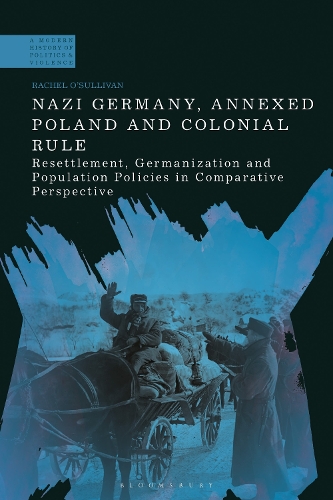
Nazi Germany, Annexed Poland and Colonial Rule: Resettlement, Germanization and Population Policies in Comparative Perspective
(Paperback)
Available Formats
Publishing Details
Nazi Germany, Annexed Poland and Colonial Rule: Resettlement, Germanization and Population Policies in Comparative Perspective
By (Author) Dr Rachel O'Sullivan
Bloomsbury Publishing PLC
Bloomsbury Academic
29th May 2025
United Kingdom
Classifications
Tertiary Education
Non Fiction
Political structures / systems: autocracy, totalitarianism and dictatorship
Second World War
943.8053
Physical Properties
Paperback
264
Width 154mm, Height 232mm, Spine 18mm
400g
Description
This book examines Nazi Germanys expansion, population management and establishment of a racially stratified society within the Reichsgaue (Reich Districts) of Wartheland and Danzig-West Prussia in annexed Poland (1939-1945) through a colonial lens. The topic of the Holocaust has thus far dominated the scholarly debate on the relevance of colonialism for our understanding of the Nazi regime. However, as opposed to solely concentrating on violence to investigate whether the Holocaust can be located within wider colonial frameworks, Rachel OSullivan utilizes a broader approach by investigating other aspects, such as discourses and fantasies related to expansion, settlement, civilising missions and Germanisation, which were also intrinsic to Nazi Germanys rule in Poland. The resettlement of the ethnic Germansindividuals of German descent who lived in Eastern Europe until the outbreak of the Second World Warforms a main focal point for this studys analysis and investigation of colonial comparisons. The ethnic German resettlement in the Reichsgaue laid the foundations for the establishment and enforcement of German society and culture, while simultaneously intensifying the efforts to control Poles and remove Jews. Through this case study, OSullivan explores Nazi Germanys dual usage of inclusionary policies, which attempted to culturally and linguistically integrate ethnic Germans and certain Poles into German society, and the contrasting exclusionary policies, which sought to rid annexed Poland of undesirable population groups through segregation, deportation and murder. The book compares these policies and the tactics used to implement them to colonial and settler colonial methods of assimilation, subjugation and violence.
Reviews
Carefully researched and intelligently argued, OSullivans excellent book offers a fascinating contribution to ongoing debates about the linkages among Nazism, colonialism, and genocide. In particular, the insights gleaned from comparing the Nazi occupation of annexed Poland to other examples of colonialism greatly enrich our understanding of Nazi population policies, including the Holocaust. * Catherine Epstein, Henry Steele Commager Professor of History, Amherst College, USA *
Author Bio
Rachel O'Sullivan is Postdoctoral Researcher at the Center for Holocaust Studies, Leibniz Institute for Contemporary History, Germany.
